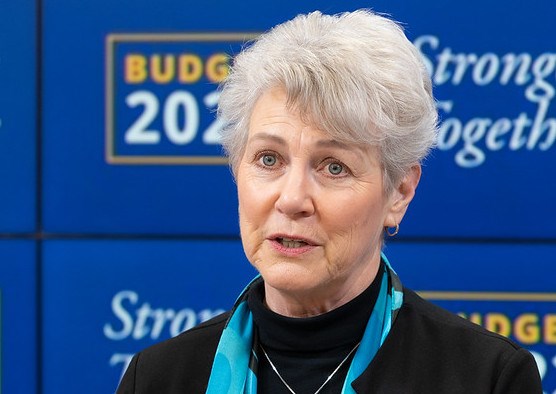Mark Twain said it best when he opined that there are three kinds of lies: Lies, Damned Lies, and Statistics. All three were on display in abundance Thursday during Katrine Conroy’s swansong press conference as finance minister.
Let’s start with the “damned lies” category, which is where you’d have to slot Conroy’s answer to my question about a provincial budget awash in red ink and a future forecast of deficits stretching as far as the eye can see.
“Most of the finance ministers in modern times have produced the plan to balance the budget,” said Palmer.
“I've not seen one from you. And you've got a $5-billion deficit. Are you likely to produce one before you retire?”
Conroy quibbled momentarily with the question before answering.
“We have a plan,” she said. “We have a plan to balance the budget, definitely.”
Alas for the minister, you need only to consult her own documents to disprove her statement.
The most recent February budget forecast three more years of provincial deficits, on top of the one finalized Thursday.
At $8 billion in fiscal 2024-25, $7.7 billion in 2025-26 and $6.2 billion in 2026-27, you could not be further from a balanced budget if you tried. It’s not a plan, it’s a mountain of debt atop an IOU for a balanced budget written in invisible ink. It’s not a path, it’s a sheer vertical cliff of deficits.
Perhaps Premier David Eby intends to table a plan to balance the budget as part of the NDP’s re-election platform.
That would be a bit rich, however, given that the NDP has attacked the Opposition BC United’s proposal to balance the budget within four years as unrealistic, claiming it would require massive cutbacks, school closures, nurse layoffs and other catastrophic events.
“Some would make deep cuts and increased fees to balance the books on the backs of people,” said Conroy. “That's just the wrong approach.”
If four years to balance the budget is unrealistic, how many years would the NDP need to do it if re-elected? Seven? An even 10? Twenty maybe? Perhaps the issue can be passed down to the children and grandchildren of the current cabinet to handle.
Whoever forms the next government will face a herculean task to dig itself out of the financial hole left by the New Democrats.
Not that Conroy acknowledged the fact Thursday. To do so would fracture the illusion that all this massive spending has produced noticeable improvements in health care, housing, crime, social services, addictions care, affordability and more.
“When people face challenges, we take action with smart, targeted investments to ease people's burdens and make sure services are there to support people in B.C. through the year and into the future,” she said.
The NDP government ended the year with a deficit almost 20 per cent larger than the one it passed through the legislature as part of the budget. At $5 billion, it recorded the largest operating deficit in provincial history (excluding the $5.5 billion deficit run at the height of the COVID-19 pandemic). Taxpayer-supported debt jumped 25.8 per cent in a single year to $75.4 billion.
Those inconvenient statistics put the lie to the picture of “smart, targeted investments” and paint a picture that more resembles runaway spending. Next year, projections on all fronts look even worse.
Conroy is set to retire in the October election. Billed as “rural tough” by the premier, the narrative pushed by the NDP upon her appointment was that the MLA for Kootenay West would bring hardened oversight to provincial finances, wrangling down expenses with the same rural grit in which she wrangles cattle on her ranch in Pass Creek.
Conroy will, instead, go down as perhaps the most extravagant finance minister in the history of the province. She’s overseen an avalanche of spending so immense that at times — especially during last year’s rush to blow out an excess one-time surplus — ministers couldn’t even publicly articulate what they were spending the money on.
She has shown no restraint, no discipline and no humility as she’s shattered deficit and debt records that would have made most politicians blanche.
Perhaps that is how the Eby administration defines success in the role of finance minister — a rubber stamp for the premier’s office and its supermassive black hole of spending, combined with the ability to stand in a message box in front of the media and denying any financial indicators are worsening, when all evidence points to the contrary.
In the end, Thursday, Conroy admitted the real decision-making in the job will have to be made by her successor.
“We will have a plan to balance, and that'll be up to the next finance minister,” she said.
At last, finally, an honest answer.
Rob Shaw has spent more than 16 years covering B.C. politics, now reporting for CHEK News and writing for Glacier Media. He is the co-author of the national bestselling book A Matter of Confidence, host of the weekly podcast Political Capital, and a regular guest on CBC Radio.



